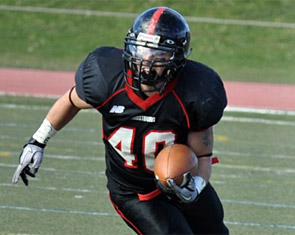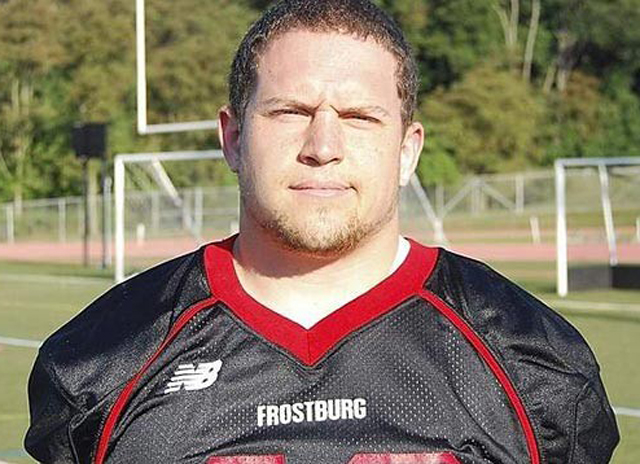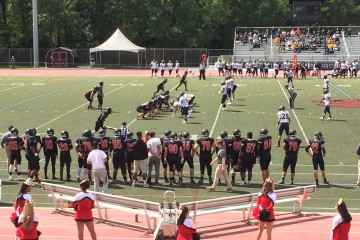Trial Date Set for Wrongful Death Lawsuit of Frostburg Football Player
A trial date has been set for the wrongful death lawsuit involving Derek Sheely, a former Frostburg State University football player who died in 2011 as a result of head injuries sustained during a football practice.
On June 20, 2016, the case will go to a 24 day jury trial, according to online court records. To find online court records, go to http://casesearch.courts.state.md.us/casesearch/ and search for Kristen Sheely, Sheely’s mother, who is a plaintiff in the case. The case number is 380569V.
Sheely’s family filed the lawsuit on August 22, 2013.
Thomas Rogish, FSU’s former head football coach, Jamie Schumacher, a former assistant coach, and Michael Sweitzer Jr., a former athletic trainer, are named in the lawsuit.
Rogish retired from coaching after the 2013 season, three months after the lawsuit was filed. Scumacher left the FSU football team in 2014. Sweitzer was employed by FSU as an athletic trainer until August 7, 2015.
“Frostburg State University is not a party to the case, but several of its employees or former employees are or may be called as witnesses,” said FSU spokesperson Liz Medcalf. “Due to the ongoing litigation, and based on advice of counsel, we are not able to comment.”

The NCAA, also named as a defendant, filed a motion to be dropped from the case. Montgomery County Circuit Judge David Boynton denied the motion on April 6.
Represented by Latham & Watkins, LLP, the NCAA argued that they did not cause Sheely’s death or increase the risk of his death. They added that Sheely knew the risks of playing the sport, which has come under fire for the prevalence of concussions.
A spokesperson for the NCAA declined further comment.
Boynton has denied multiple motions by the defendants to exclude expert witness testimonies, including from Robert Cantu, M.D., a prominent concussion expert; Dr. Scott Bruce, an Assistant Professor of Kinesiology and Health at Wright State University; David Egilman, M.D.; and Dr. Mariusz Ziejewski, a member of the North American Brain Injury Society.
Kranos Corp, a helmet-manufacturer in Illinois, and George Heider, a retailer in Pennsylvania, have also been named.
In their civil suit, the Sheely family alleges that, “Utter incompetence, egregious misconduct, false hope and a reckless disregard for player health and safety led to the tragic death of Derek Sheely.”
Steve Nolan, who is representing the Sheely family, has yet to return a request for comment.
The Klamann Law Firm, which is litigating cases against the Kansas City Chiefs and the St. Louis Cardinals, and the Popham Law Firm are also representing the plaintiffs.
Sheely was a 22-year old, two-time Academic All-Conference Senior at FSU. In August 2011, he began his final year of collegiate football as the starting fullback for the football team.
The complaint, which can be found here, alleges that, “a basic disregard to player safety” led to the death.
The complaint explained that Sheely was initially injured during practice while participating in what was known by players as “The Drill.” This drill is, essentially, a more dangerous version of the Oklahoma drill, which coaches implement around the country at the high school and college levels. According to the complaint, this drill has been criticized by the National Football League to be “dangerous” and “meaningless.”
In “the drill,” a fullback runs full speed and hits a defenseless linebacker, who was allegedly told by coaches not to defend himself.
These hits are the equivalent to a small car crash, according to the complaint. Allegedly during the 2010 football season, at least one player sustained a concussion participating in “the drill” and, just days before Sheely’s incident, two players on his own team sustained concussions taking part in “the drill.” According to the complaint, some players quit the team because of “the drill,” and if players did not participate in “the drill,” they would be verbally abused by coaches.
The complaint goes into detail about how Sheely’s head problems started. While participating in “the drill,” Sheely’s forehead allegedly started to bleed profusely. He was examined by assistant athletic trainer Michael Sweitzer Jr. and bandaged up according to the plaintiffs. However, no concussion tests were done and Sheely was not evaluated properly, according to the complaint.
Allegedly, Sheely’s head was busted open four times in a three day span, and not once was he tested for a concussion. Instead, he was allowed to continue practice. Players on the Frostburg State football team were taught to ignore injuries or penalties will come, according to the complaint. The complaint also claims that team policies included a clause stating that if a player cannot practice Wednesday than they can expect not to play Saturday, on game day. Another alleged policy was “great champions can distinguish between pain and injury.”
According to the plaintiff’s claim, on the day of August 22, 2011, Sheely was allowed to practice in full and without a concussion evaluation. Sheely allegedly took part in “the drill” that day and started to bleed profusely again from the forehead and again was allowed to continue practice. According to the complaint, during plays before the fatal blow, Sheely complained to coaches about a “headache” and how he “didn’t feel right.” However, defendant Schumacher allegedly yelled, “Stop your bitching and moaning and quit acting like a pussy and get back out there, Sheely!”
The complaint states Sheely was later involved in a collision with a defender. According to the complaint, although the hit was relatively mild, it had an impact that triggered second-impact syndrome causing Sheely to collapse. After which, he never again regained consciousness. Sheely’s final collision caused brain herniation, an acute subdural hematoma, and massive vascular engorgement.
According to the suit, Derek Sheely was airlifted to the hospital where he remained comatose for six days; he continued to suffer from conscious pain until his death.
The NCAA and Schutt Sports are involved in the case for different reasons. According to the complaint the NCAA had a purpose to protect student-athletes. As for Schutt Sports, they allegedly advertised their helmets to be the safest.
The lawsuit filed by the Sheely family is simply one side of the story. The complaint describes what may have happened leading up to Derek’s death and ways in which the situation could have been avoided all together.
Former Bottom Line Reporter Rob Michels contributed reporting.





58 Comments